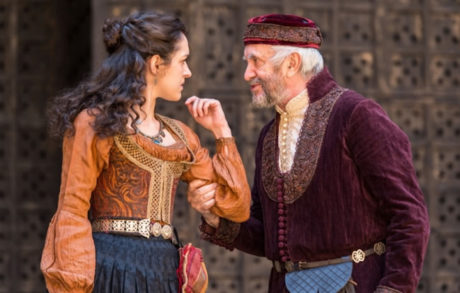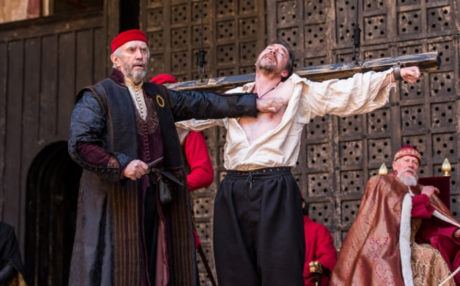The appropriately psychologically penetrating and vivid production of The Merchant of Venice (now playing at The Kennedy Center’s Eisenhower Theater) embraces all the conundrums of William Shakespeare’s conceivably most controversial play. Luckily for the theatergoer, top-notch acting and superior technical elements propel the dramatic and thematic thrust of this play with considerable aplomb. A valuable transfer from the prestigious Shakespeare’s Globe of Great Britain, this compelling production pulls in all the dynamics of Shakespeare’s elegantly witty, trenchant and piercing prose with finesse and ease.

Authenticity is the hallmark of this stellar production. If you like your Shakespeare presented in an unadulterated, robust, cogent and classical style, this is a Shakespearean production that you cannot afford to miss. As In Shakespeare’s time, the play is presented in a very interactive and open style with the fourth wall totally dissolved through most of the proceedings.
Under Director Jonathan Munby’s astute and all-encompassing direction, nothing is presented in a didactic or heavy –handed fashion: all of this challenging play’s moments —-dramatic or comic —are authentically realized with a detailed eye for the period of time that is evoked. Munby’s respect for theatrical tradition, however, is melded beautifully with his keen integration of deeply relevant issues that impact individuals in the present time — from religious intolerance to excessive legalism and to familial rights and responsibilities.
The entire first part of the of the production prior to intermission sparks immediate authenticity for, as the audience is being seated, masked minstrels and revelers frolic up and down the aisles and invite audience members to join in the merriment. A fine group of musicians under the Musical Direction of Jeremy Avis and joyous choreographic movement from general cavorting to courtship rituals (credit Choreographer Lucy Hind) added immeasurably to the interactive ambience of the production.
Lighting Design by Oliver Fenwick was also shrewdly devised as the house lights were left on during the sections of the play prior to intermission ——only to be dimmed during the more somber and tragic turn of events after intermission (as the play approached its sobering conclusion). Throughout the play, shafts of light and smoke filtered through the slat-like walls of the set and produced an earthy and realistically evocative effect. Designer Mike Britton’s Scenic Design was spare yet strikingly and impressively utilitarian throughout.
Jonathan Pryce’s portrayal —–the esteemed and well-known veteran of stage (Miss Saigon, The Comedians) and screen (Evita, Carrington, Tomorrow Never Dies) —- of Shylock, the Jewish moneylender, was commanding and exuded an air of enigmatic excitement. Pryce etched his portrayal with a fluidity of nuance from ironic sagacity to justifiable ire and, finally, to utter despair and humiliation. He creates a Shylock who understands the complexities of the world; his Shylock defies any easy, facile stereotype or categorization. Pryce’s delivery of the famous soliloquy “Hath not a Jew eyes? Hath not a Jew hands, organs, dimensions, senses, affections, passions……..” is delivered in a heightened emotionally unsettling tone so different from many previous interpretations, yet, his delivery succeeds with sweeping power and righteous, very human indignation. I simply could not take my eyes off JonathanPryce whenever he was on stage.
As the play develops, it becomes clear that Director Munby makes this production all the more effective by directing the initial Acts of the play as lighter in tone while contrasting this with the darker mood of the concluding Acts —-especially in the foreboding gloom of the Courtroom Scene.
Munby also allows the Shakespearean trademarks such as gender identity/role reversals, the usual sets of various romantic pairings, and the inventive wordplay and (often) sexual puns to take full latitude in his production -–in order to make the emotional contrasts so inherent in life all the more readily apparent. These Shakespearean machinations that the audience enjoys and accepts so willingly are all the more to be savored –as we are all too readily thrown into the utter degradation of Shylock being forced to give up his money, see his daughter convert to Christianity and as he is forced to convert to Christianity himself.
Rachel Pickup’s Portia has a voice that is equal parts honey and vinegar yet these ingredients produce a voice with marvelously-shaded alternately captivating yet astringent line-readings. Ms. Pickup glides across the stage with a lithe grace and a rarefied poise. The theme of legalism versus mercy in the soliloquy “The Quality of Mercy is not strain’d, It droppeth as the gentle rain from heaven ……” was sensitively rendered by Pickup.
Indeed, Pickup may have carried the acting honors in an evening of very skilled and solid ensemble work. Especially amusing was her Pickup’s scathingly witty reactions and retorts to a trio of suitors who have to pick the correct chest (out of three chests —one with gold, one with silver and one with lead) in order to woo her hand.
As Portia’s eventual suitor, Dan Fredenburgh, cuts a fine figure as Bassanio. Mr. Fredenburgh struck just the right balance between patient wooing and frustration in his portrayal.
As the “go-between” between Shylock and Bassanio, Dominic Mafham’s Antonio evoked an intriguingly ambivalent portrait of a forlorn soul —only saved by luck and fate at the very last minute. Mr. Mafham’s character was multi-faceted and obviously showed a homoerotic passion for Bassanio.
Andy Apollo’s Lorenzo was appropriately callow and “mock-heroic” as the suitor of Jessica (Shylock’s daughter).

Jonathan Pryce’s own real-life daughter, Phoebe Pryce, played the role of Jessica to perfection. She excelled as she flirted with her suitor and as she sang a powerfully tragic Jewish lament for her father in the tragic closing scene.
Jolyon Coy as the lusty and boisterous Gratiano brought all these qualities and more to his role. Coy was particularly witty and ribald in many of his scenes with his male companions.
As Portia’s maid, Nerissa, Dorothea Myer-Bennett delivered an earthy and common-sense portrayal of a woman who clearly understands the vagaries of the world.
Giles Terera’s Prince of Morocco and Christopher Logan as the Prince of Arragon delivered very precisely-developed comic portrayals that could well be definitive studies in how to develop a fully-etched Shakespearean comic character.
Special mention must be given to Composer Jules Maxwell, Sound Designer Christopher Shutt, Fight Director Kate Waters, and Voice and Dialect Coach Martin McKellan.
While heightening the themes that are relevant to the current state of the world, Director Jonathan Munby has succeeded in creating a production of The Merchant of Venice that is all a Shakespearean purist could ever hope for!
Running Time: Two hours and 45 minutes, with one 15-minute intermission.
The Merchant of Venice plays through July 30, 2015, 2016 at The Kennedy Center’s Eisenhower Theater – 2700 F Street, NW, in Washington, DC. For tickets, call (202) 467-4600, or purchase them online.




